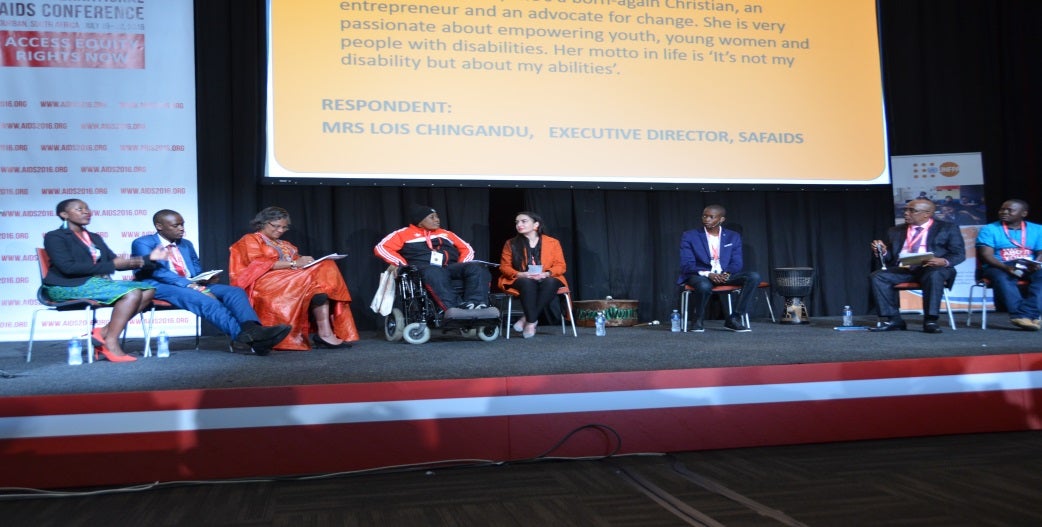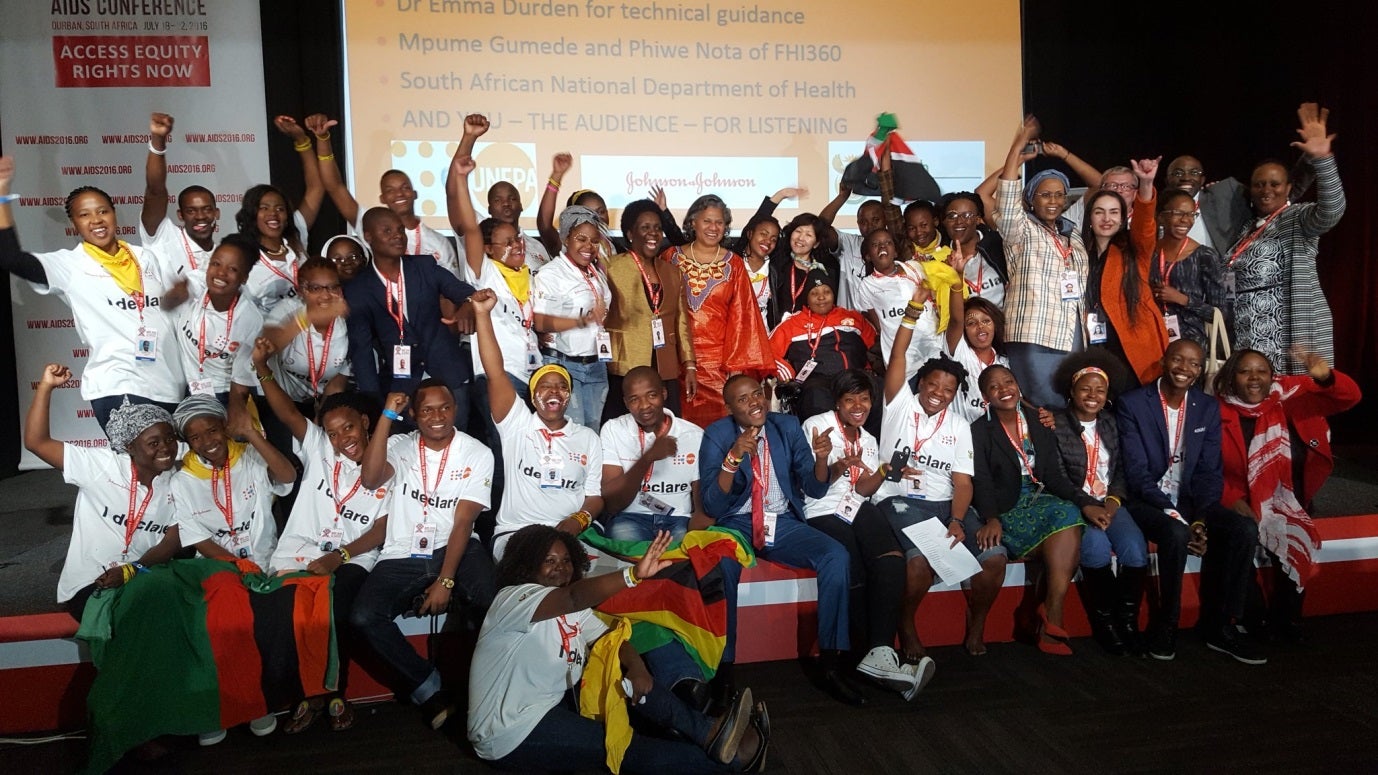Dubbed a session with a difference, on 18 July 2016, UNFPA Country Office in South Africa, in collaboration with Johnson & Johnson and the South African National Department of Health hosted a vibrant and lively Youth Satellite Session at the 2016 International AIDS Conference in Durban. The South African Minister of Health, Honourable Dr Aaron Motsaoledi, SAFAIDS Deputy Executive Director, Ms Rouzeh Eghtessadi and UNFPA Regional Director, Dr Julitta Onabanjo, joined the young people as respondents, engaging them in meaningful dialogue to end AIDS and achieve Universal Access to Sexual and Reproductive Health and rights by 2030. Special representation was ensured from young people living with HIV, young key populations, young people with disabilities, and young people who are survivors of sexual violence and child marriage. The key networks that were represented included: DREAMS Youth Ambassadors, UNFPA Youth Advisory Panel members, Africa Young Positives, and Africa Youth and Adolescents Network for Population and Development (AfriYAN).

The objective of the session was to highlight the commitment of young people towards achieving an AIDS Free Generation. They creatively shared their perspectives, challenges & stories and showcased youth leadership in ending AIDS and achieving Universal Sexual Reproductive Health and Rights by 2030 through creative arts and performance.
A central theme that was addressed throughout the session was the challenge of accessing youth-friendly Sexual and Reproductive Health (SRH) services by adolescents and youth in health facilities and other settings in the community. The Minister of Health acknowledged that there was a strong consensus that healthcare workers in healthcare facilities have negative attitudes towards young people seeking SRH services, especially contraception, and that this was a major deterring factor for adolescents and youth accessing these services. Linked to this, was the lack of access to information and services for youth and key populations due to stigma and discrimination, as well as lack of resources to effectively deal with their SRH issues. A young person from Uganda declared that “we as young people must advocate for measures to avoid and prevent HIV and collaborate with fellow advocates and government to ensure that services are availed to those that need them; and that staff must be positively-minded about those individuals that seek services. We call upon our government to ensure that circumcision services are available at every government health centre so that people can easily access them.”

Bonakele Zungu, a UNFPA Youth Advisory Panel member who also serves on the committee of Disabled Youth of South Africa, noted the challenges faced by disabled young people and added that “we tend to talk for disabled people and we do not involve them in decision making." A young person from Malawi retorted that “we need adequate resources to make services available and accessible to all young people living with HIV and those living with disabilities.”
The images and poems focused on areas where young people turn for support, and where they have been let down, for example at school, at home, health- care setting and in the community. A powerful poem was a positive affirmation that when young people work together, they can support each other and bring about change!
We are like a river that flows
And those who are thirsty can drink
They drink knowledge
Perseverance
They drink
We declare us
We sing like a river that flows
Sing Africa free of AIDS
For we declare our Africa shall be
An HIV and AIDS free zone.
The Youth Satellite Session was concluded by young people from different countries summarising how to end AIDS and achieve Universal Sexual and Reproductive Health and rights by 2030 through reading of declarations:
South Africa: “We declare we will end AIDS in South Africa by having peer educators at schools so that youth can fight negative peer pressure and other young people can learn to live a positive life. Young people can influence other young people to have a healthy lifestyle just like they influence each other in drinking and more.”
Burundi: “We declare we will educate young people on how to prevent AIDS, and will partner with youth around the world; volunteering our time, expertise and resources on this education to fight stigma and misinformation.”
Kenya: “We declare we will educate young women and girls about the importance of taking care of their bodies. We declare to involve adolescents and young people meaningfully, especially those who have been marginalised and previously ignored. We declare to work with government, civil society, private sector, and the faith sector to ensure integrated interventions are developed in education, agriculture, tourism, and health for young people.”
Zambia: “We declare that we will actively engage young people in the fight against HIV and AIDS: nothing about them without them.”
Swaziland: “We declare that we need to invest more and Act more towards ending AIDS by 2030 through collaborative efforts!”
Cameroon: “We declare that we will put more efforts into comprehensive sexuality education. We declare that we need empowerment to operate income generating activities to free ourselves from poverty; and that empowerment that can lead people to being responsible and accountable.”
Zimbabwe: “We declare that we will use the power of the platforms we have been given to ensure that every girl-child shall be free from sexual violence of any kind. We will uplift every young person we see in need of assistance with SRHR issues, and will speak out and create awareness on SRH issues faced by minorities.”
Ghana: “We declare that we need tools and preventive and therapeutic vaccines to end AIDS. Funding is the main fuel to ending AIDS. Each government should prioritise every agenda provided on ending AIDS. Government must DECLARE!”
Botswana: “We declare that access to sexual education and sexual rights should be available to youth across the world. Through local-level awareness campaigns, we can help break stigma and promote education on sexual rights and sexual health. We aim to educate adults and parents to foster the destruction of these barriers, as a first step to ending AIDS.”
Tanzania: “We declare that young people are not a liability, but an asset worth investing in for sustainable development. Partnerships should be forged to develop a culture of accountability and continuity. We call on our fellow young people to thrive and secure our space and recognition in issues of development. The time to act is now.”


